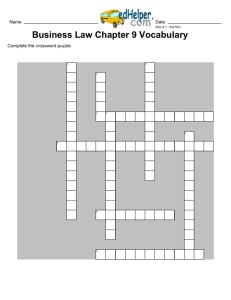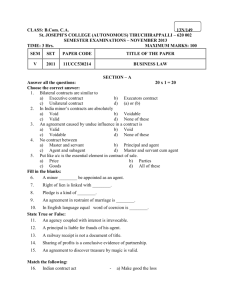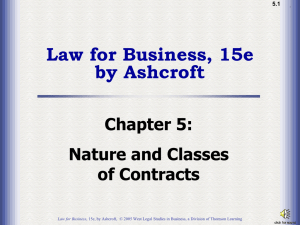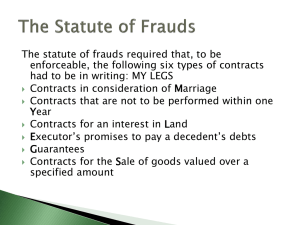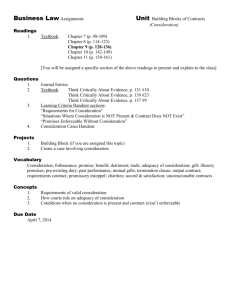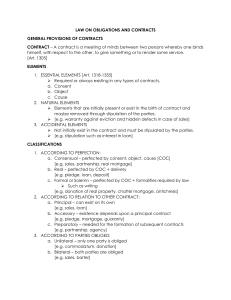LAW & YOU Unit 2 Test: Chapters 6-11
advertisement
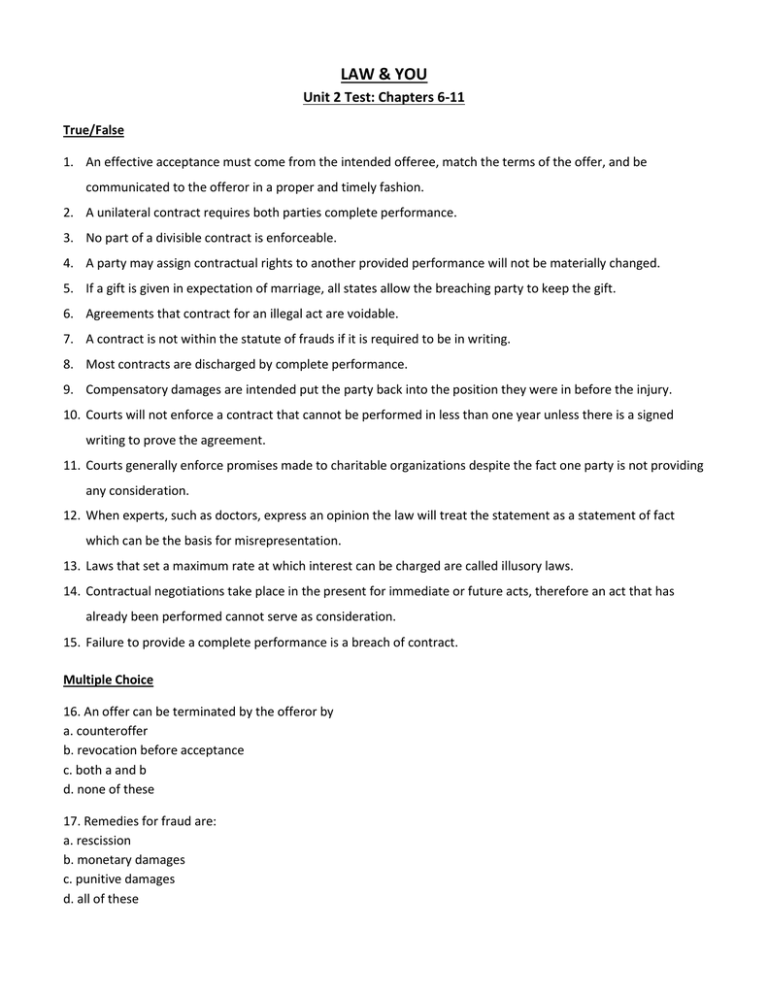
LAW & YOU Unit 2 Test: Chapters 6-11 True/False 1. An effective acceptance must come from the intended offeree, match the terms of the offer, and be communicated to the offeror in a proper and timely fashion. 2. A unilateral contract requires both parties complete performance. 3. No part of a divisible contract is enforceable. 4. A party may assign contractual rights to another provided performance will not be materially changed. 5. If a gift is given in expectation of marriage, all states allow the breaching party to keep the gift. 6. Agreements that contract for an illegal act are voidable. 7. A contract is not within the statute of frauds if it is required to be in writing. 8. Most contracts are discharged by complete performance. 9. Compensatory damages are intended put the party back into the position they were in before the injury. 10. Courts will not enforce a contract that cannot be performed in less than one year unless there is a signed writing to prove the agreement. 11. Courts generally enforce promises made to charitable organizations despite the fact one party is not providing any consideration. 12. When experts, such as doctors, express an opinion the law will treat the statement as a statement of fact which can be the basis for misrepresentation. 13. Laws that set a maximum rate at which interest can be charged are called illusory laws. 14. Contractual negotiations take place in the present for immediate or future acts, therefore an act that has already been performed cannot serve as consideration. 15. Failure to provide a complete performance is a breach of contract. Multiple Choice 16. An offer can be terminated by the offeror by a. counteroffer b. revocation before acceptance c. both a and b d. none of these 17. Remedies for fraud are: a. rescission b. monetary damages c. punitive damages d. all of these 18. A promise may be enforced under the doctrine of promissory estoppel when a. a person promises to do something he or she is already obligated to do by law b. a person promises to do something that he or she is already obligated to do by prior contract c. someone intends a gift but consideration is not present d. all of these 19. A minor can ratify a contract by: a. emancipating themselves b. reaching the age of majority c. both a & b d. none of these 20. A contract for goods and services that are not necessaries can be disaffirmed by a person lacking contractual capacity a. within a reasonable time after ratification b. within a reasonable time after attaining capacity c. any time after ratification d. any time after attaining capacity 21. If a unilateral mistake occurs the contract is _____ but if a bilateral mistake occurs the contract is ______. a. Valid; Voidable b. Voidable; Void c. Void; Voidable d. Voidable; Valid 22. The intentional misrepresentation of a material fact is known as: a. Mistake b. Fraud c. Rescission d. Duress 23. Statements are treated as misrepresentations of law if all of the following are present EXCEPT: a. The untrue statement is one of fact or there is active concealment b. The statement is material to the transaction or is fraudulent c. The victim reasonably relied on the statement d. The victim made a unilateral mistake 24. The statute of limitations for breach of contract is _____ years. a. 1 b. 2 c. 3 d. 4 25. All of the following are examples of individuals that lack contractual capacity EXCEPT: a. Intoxicated b. Mentally incapacitated c. Minors d. Government workers 26. People who work for businesses or other organizations that have the capacity to bind the organizations to contracts are said to be within the: a. statute of limitations b. scope of authority c. in loco parentis d. forbearance 27. In addition to discharge by complete performance, a contract may be discharged by: a. agreement b. impossibility of performance c. operation of law d. all of these 28. The primary guideline in classifying major versus minor breaches is the a. amount of money involved b. Significance of the parties involved c. significance of the breach in relation to the entire contract d. percentage of the contract that is breached 29. When there is a change in the legal position of the party as a result of the contract, the contract is said to have: a. consideration b. performance c. novation d. legal value 30. A new contract formed by one party releasing the other from the duty of performance and accepting a substitute party is called: a. forbearance b. novation c. performance d. consideration 31. When the statute does not clearly state that a certain contract is enforceable, the courts look at: a. the impact of the violation on the public welfare b. how directly the contract and the violation of the statute are connected c. how involved the parties are in the violation of the statute d. all of these 32. What parties give and get as consideration need not be of equal economic value, however unless one party is giving a gift there must be at least a token amount given, known as ___________ consideration. a. Adequate consideration b. Nominal consideration c. Legal consideration d. Performed consideration 33. A covenant not to compete is valid based on all of the following EXCEPT: a. Geographic area b. Time period for the limitation c. Employer’s interest protected by the limitation d. Ratification by the offeree 34. All of the following contracts must be in writing EXCEPT: a. To buy or sell goods of $100 or more b. To buy or sell real property c. Those that require more than one year to complete d. Promises to pay the debt or answer for a legal obligation of another person 35. Damages intended to make an example of the party who caused the injury are known as: a. compensatory b. consequential c. punitive d. liquidated Matching 36. Conduct suggesting you intend to be bound by the contract. 37. Taking back an offer. 38. Injured party has the ability to cancel the contract 39. A legally binding, enforceable contract 40. Contract is invalid and cannot be enforced. 41. Threat made to obtain agreement 42. Party in a position of trust dominates & takes advantage of their authority 43. The act or promise to complete an act 44. Agreement to not do something 45. Refusal to be bound by a contract A. Duress B. Valid C. Void D. Voidable E. Undue Influence AB. Consideration AC. Rescission AD. Forbearance AE. Disaffirmance BC. Ratification BD. Usury Short-Answer -Be thorough using all of the space provided in answering all five questions. Include specific terms & examples for each (5 pts). 46. What are the six major requirements that must be satisfied before courts will treat a transaction as a legally enforceable contract? 47. What are the five types of executor contracts that require a writing? 48. Vanden Dolatowski, a mature-looking minor, lied about his age when he financed a car stereo system from Astro Audio, Inc. in June of 2010. He used his older brother’s license and name on the financing application. By October, Vanden had paid $400 of the $1,000 contract but decided the stereo was a waste of money. He went back to the store demanding the return of all payments. Must the store return his money and were there any torts committed? 49. Timmy Nemec was admitted to the hospital as an emergency heart transplant patient. The next day the hospital’s business manager discussed the cost of the surgery with Tim’s two sons. Both sons told the manager, “Do whatever is necessary to save his life, and we will pay you.” When the hospital presented the bill for $140,000 the two sons said the contract was oral and therefore they were not liable. Are they correct? Why or why not? 50. Katie Szabla, a 28 sophomore at Vincennes Community College, received the diamond engagement ring, appraised at $7,000, from her grandmother’s estate. Payton was low on cash and needed tuition money. She decided to sell it to a jeweler who said, “The setting is old-fashioned, but the diamond is forever. I’ll give you $3,000 cash.” Later, Payton tried to sue claiming she did not receive legally sufficient consideration. Can Payton rescind the transaction?

